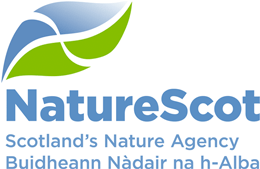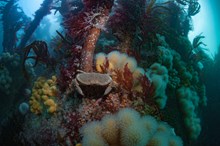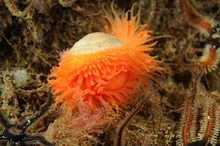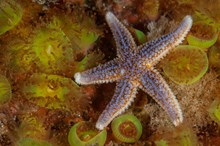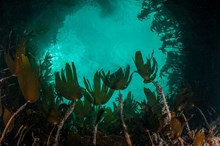25 June, 2020
From sofa to seabed: virtual training to explore marine life
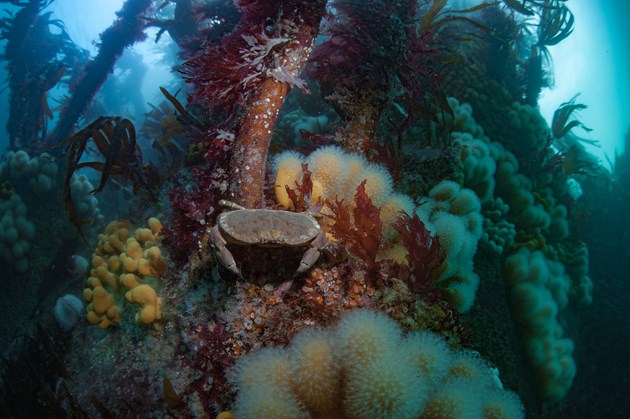
Communities can now survey Scotland’s seabed and coastlines from the comfort of home with the launch of innovative virtual training.
From the critically endangered flapper skate to vast kelp forests, basking shark feeding grounds to delicate maerl and flame shell beds, Scotland’s seas and shores support an estimated 8,000 species of plants and animals.
In Scotland’s Year of Coasts and Waters, Scottish Natural Heritage (SNH) wants to encourage more people to get involved in recording and monitoring their local marine life. The Community-led Marine Biodiversity Handbook – Scotland’s first “how to” guide - has been developed including comprehensive information and resources for planning and carrying out surveying and monitoring.
While coronavirus restrictions mean that surveying in the field may be on hold for the foreseeable future, SNH is launching new online training to accompany the handbook that will help those interested get started right away.
The training allows people to learn about different habitats and species and improve their survey skills by taking a virtual dive, to experience and practice those skills on real survey footage of a variety of locations around Scotland.
It is aimed at a wide range of users, including coastal communities, local environment groups and those who use the sea for work or recreation.
SNH project officer Caitlin Orr said: “We developed the handbook in response to the clear message we hear from people all around Scotland that they want to get more involved with their local coasts and waters and the decisions that affect them.
“The ongoing coronavirus restrictions inevitably mean that people won’t be able to get out and about using the handbook as we had hoped, but we wanted to develop a way for people to get started and begin to boost their skills right away.
“We hope that together with the handbook, this online training will inspire and support more people to get involved in monitoring our seas and shorelines when it is safe to do so.”
Community-led monitoring can play a valuable role in boosting our knowledge of marine species and habitat distribution around Scotland. The ultimate aim is to increase participation in marine biodiversity survey and provide resources and support to allow this to be done efficiently, safely and enjoyably. SNH is also working to ensure the data collected by communities is of the highest quality so that it can make a valuable contribution to future research.
The Community-led Marine Biodiversity Monitoring Project is a partnership between SNH, Fauna & Flora International (FFI), communities, local groups and individuals, with funding support from the William Grant Foundation.
Kerri Whiteside, FFI’s marine community support officer, said: “Those who live along Scotland’s breath-taking coastline are incredibly motivated to explore, and look after, the marine life that exists in their nearby waters.
“FFI is delighted to be working with SNH to enable better access to biodiversity monitoring tools and practices - pooling knowledge and skills together through collaborative initiatives like this will ultimately ensure that we have healthier seas into the future.”
Nick Addington, Chief Executive of the William Grant Foundation, said: “The William Grant Foundation is delighted to support this partnership between Scottish Natural Heritage and Scotland’s coastal communities.
“No-one has more of a stake in the health of our marine environment than the people who live and work in and around our coasts. We hope this initiative will empower local volunteers and community groups to play a greater role in efforts to understand and protect marine habitats and species.”
ENDS
For more information, contact the SNH press office on snhmedia@nature.scot or 0131 316 2655.
Contact information
- Name
- NatureScot Media
- Telephone
- 0131 316 2655
- media@nature.scot
Notes to editors
Take a look at the Community-led Marine Biodiversity Monitoring Handbook on the SNH website and explore the virtual training.
Fauna & Flora International’s (FFI) mission is to conserve threatened species and ecosystems, choosing solutions that are sustainable, based on sound science, and account for human needs. FFI’s approach is to work with in-country organisations - from local community groups and NGOs to small and large businesses and government agencies - believing that conservation impact is best achieved through the involvement of those affected by the decisions made. FFI’s Marine Community Support project launched in Scotland in 2014, in collaboration with the Community of Arran Seabed Trust (COAST), to provide direct support to active communities along Scotland’s coast. By enabling coastal community groups across Scotland to undertake positive action, and to work together to influence wider policy, FFI’s work harnesses social action and contributes to safeguarding and restoring Scotland’s precious marine environment.
The William Grant Foundation is a non-profit association established to support charitable causes, principally in Scotland. Its work is funded by William Grant & Sons Ltd. The company has long given to a wide range of non-profit and charitable organisations and projects across Scotland and remains committed to donating 1% of pre-tax profits each year to charitable causes. The company’s family shareholders established the William Grant Foundation in 2014 to oversee and direct its donations. The William Grant Foundation is committed to a future where everyone in Scotland has the opportunity to thrive, a belief that is deeply rooted in the core values shared by the family and the company. For more information see the Foundation’s website www.williamgrantfoundation.com, or contact foundation@wgrant.com
NatureScot is Scotland's nature agency. We work to enhance our natural environment in Scotland and inspire everyone to care more about it. Our priority is a nature-rich future for Scotland and an effective response to the climate emergency. For more information, visit our website at www.nature.scot or follow us on X at https://x.com/NatureScot
’S e NatureScot buidheann nàdair na h-Alba. Bidh sinn a’ neartachadh àrainneachd na h-Alba agus a’ brosnachadh dhaoine gu barrachd suim a chur ann an nàdar. Tha e mar phrìomhachas againn gum bi nàdar na h-Alba beairteach agus gun dèilig sinn gu h-èifeachdach le èiginn na gnàth-shìde. Tha an tuilleadh fiosrachaidh aig www.nature.scot no air X aig https://x.com/NatureScot
